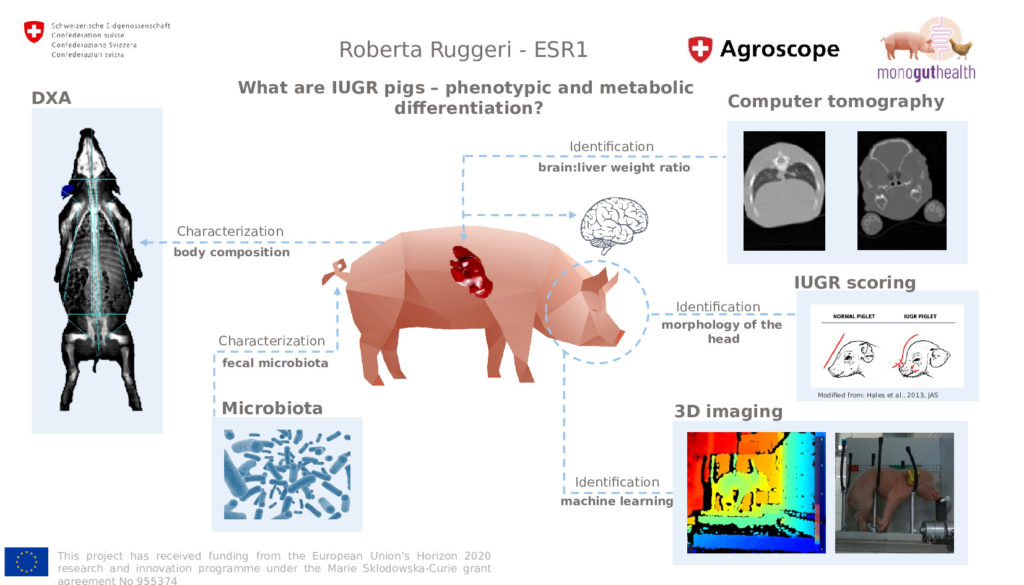ESR1: What are IUGR pigs? – phenotypic and metabolic differentiation
Background
The selection for hyperprolific sows led to an inadequacy between the number of fetus and the uterine capacity. This phenomenon results in impaired placental development and therefore impaired development of some fetuses. The so-called Intra Uterine Growth Retarded (IUGRIntra-uterine growth retardation, is defined as the impaired growth of the fetus or its organs durin…) piglets display greater early postnatal mortality and morbidity risks, impaired postnatal growth, impaired carcass and meat quality traits. From an animal welfare as well as from a production efficiency point of view IUGRIntra-uterine growth retardation, is defined as the impaired growth of the fetus or its organs durin… piglets are problematic.
Objectives
Characterise phenotypically and metabolically the IUGRIntra-uterine growth retardation, is defined as the impaired growth of the fetus or its organs durin... subpopulation and identify their specific nutritional needs in early life.
Define a machine-learning model to describe the IUGRIntra-uterine growth retardation, is defined as the impaired growth of the fetus or its organs durin... subpopulation thanks to the analysis of piglets' pictures.
Identify IUGRIntra-uterine growth retardation, is defined as the impaired growth of the fetus or its organs durin... specific physiological traits using a metabolomic based approach.
Methods
Computed tomographyA non-invasive imaging technique used to obtain 3-dimensional images of the internal organs, bones, ... (CT) - scan imaging will be used to non-invasively assess the piglets’ brain: liver w/w ratio, as the gold standard to identify IUGRIntra-uterine growth retardation, is defined as the impaired growth of the fetus or its organs durin....
3D-pictures of newborn piglets will be taken to measure morphological parameters. A machine-learning model will be developed to correlate the brain: liver weight ratio to visual characteristics of head shape, body form and other possible traits.
The postnatal characteristics of the piglets (body composition, metabolomeDescribes the complete set of all low-weight molecules that can be quantified in a biological sample..., and microbiomeThe diverse consortium of bacteria, archaea, fungi, protozoa, viruses, and their collective genome f...) will be investigated.
Expected results
Phenotypic cut-off values for IUGRIntra-uterine growth retardation, is defined as the impaired growth of the fetus or its organs durin... pigs defined (D1.2).
Differentiation based on the metabolomics profile of IUGRIntra-uterine growth retardation, is defined as the impaired growth of the fetus or its organs durin... and ́normal ́ pigs established (D2.14).
Planned secondments
- At: CSEM (3 mo); build a Machine Learning Model based to diagnose IUGR at birth;
- At: UFA Bühl (3 mo); test and validate the Machine Learning Model;
- At: UNIBO (3 mo); metabolome analysis and bioinformatics of blood samples collected in the experiments.
Enrolment in Doctoral degree:
ESR1 will be enrolled at the Department of Agricultural and Food Science (DISTAL), University of Bologna.
Supervisors
Catherine Ollagnier (Agroscope), Giuseppe Bee (Agroscope), Paolo Trevisi (University of Bologna)
